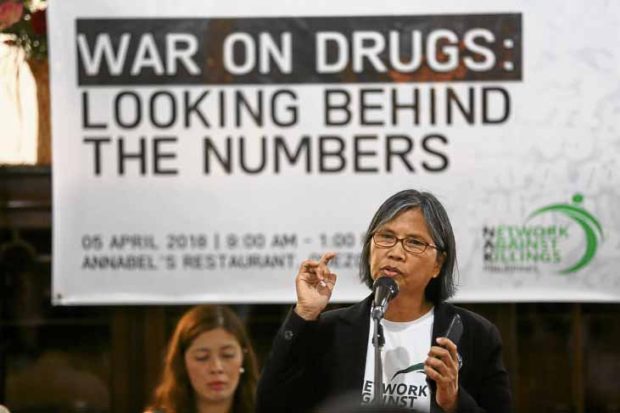PNP to release drug war files only on ‘case-to-case basis’

NETWORK AGAINST KILLINGS Lily Flordelis, a convener of theNetwork Against Killings in thePhilippines, urges closer scrutiny of the figures pertaining to the government’s campaign againstillegal drugs during a forum at a restaurant in Quezon City. —NIÑO JESUS ORBETA
CEBU CITY—The Philippine National Police is willing to submit to the Supreme Court records of the thousands of killings in President Duterte’s war on drugs but only on a “case-to-case basis,” PNP Director General Ronald dela Rosa, said on Thursday.
“We can’t divulge everything because we have projects that involved not just policemen but civilians as well,” the outgoing PNP chief told reporters here.
Dela Rosa said disclosure of information on those projects could endanger the lives of the PNP informants.
Waiting for Calida’s next move
“If drug syndicates would know about it, I pity those people who gave us the information so that members of these syndicates would be arrested,” he said.
Dela Rosa said the PNP was waiting for the next move of Solicitor General Jose Calida, who lost his appeal of the Supreme Court’s Dec. 5, 2017, order to the police to hand over all the records of more than 4,000 killings in the drug war.
The high court, which is tackling a petition brought by families of slain drug suspects challenging the legality of the war on drugs, threw out Calida’s appeal on Tuesday and gave him 15 days to submit all the records.
‘Manufactured’ records
According to Sen. Antonio Trillanes IV, however, the PNP will have trouble producing the records because those are “manufactured” and can be easily “disproved.”
For the same reason, the PNP failed to submit the records to the Senate inquiry into extrajudicial killings in the drug war, Trillanes told reporters in a forum on Thursday.
“[The PNP] will not be able to produce these reports because these were all manufactured,” he said. “If a forensic investigation is done, the question is where [were the suspects] shot? In the head and in the back. That will be a problem,” he said.
Trillanes said the PNP would also have to produce more than 4,000 guns, as it claims that the more than 4,000 suspects were killed because they fought back.
“This will be difficult,” he said, adding that it would also be a problem for the police to produce fingerprints and powder burns to show that the suspects indeed resisted arrest.
Dela Rosa has said President Duterte has given instructions not to release the records without his permission.
Whether the PNP will ask Mr. Duterte to allow the release of all the records or just allow itself to be cited for contempt remains to be seen, Trillanes said.
The Commission on Human Rights (CHR) also wants copies of the records for its investigation of cases brought by relatives of slain drug suspects.
47 rights cases filed
Jacqueline de Guia, spokesperson for the CHR, said on Thursday that the commission had filed 47 administrative and criminal cases related to the drug war.
De Guia said the CHR was investigating 1,100 cases of rights violations by police and attacks by so-called vigilantes.
Trillanes also said he planned to challenge in the Supreme Court the validity of Mr. Duterte’s withdrawal of the Philippines from the Rome Statute that established the International Criminal Court, where the President and 11 of his officials are facing investigation for possible crimes against humanity over the drug war killings.
Trillanes reiterated his position that the withdrawal was invalid because it did not have the concurrence of the Senate. —WITH A REPORT FROM JHESSET O. ENANO